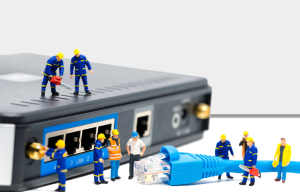In today's interconnected world, your home's Wi-Fi router plays a pivotal role in daily life. But how can one determine if their router is falling behind the times? Knowing when to consider a Router Upgrade is crucial for maintaining optimal performance and security in your home network.
Signs of an Aging Router
1. Slow Internet Speeds
If your internet is sluggish, despite having a high-speed plan, your router might be the bottleneck. Old routers might not be equipped to handle faster internet speeds offered by newer plans. This discrepancy can lead to frustratingly slow browsing and streaming experiences.
2. Frequent Disconnections and Instability
A clear sign of an outdated router is frequent loss of connectivity. If your devices keep disconnecting from the Wi-Fi or the router requires constant reboots, it's a strong indication that your router is struggling to manage the network.
3. Lack of Security Updates
Security is paramount in today's digital landscape. Older routers may not receive firmware updates, leaving your network vulnerable to cyber threats. If your router manufacturer no longer supports your model with the latest security updates, it’s time to consider a Router Upgrade.

4. Limited Range and Dead Zones
As routers age, their effectiveness in broadcasting signals across your home can diminish, resulting in dead zones. Newer routers offer improved range and stronger signals, ensuring consistent connectivity throughout your home.
5. Incompatibility with Newer Devices
Technology evolves rapidly, and so do the standards for connectivity. If your newer devices struggle to connect or perform poorly with your router, it could be due to outdated hardware that can't support modern Wi-Fi standards.
6. Overheating and Hardware Malfunctions
Like any electronic device, routers can suffer from wear and tear. Overheating, unusual noises, or frequent restarts are signs of physical deterioration, indicating that your router is reaching the end of its lifespan.
7. Evolving Home Networking Needs
Your networking needs today might be different from when you first got your router. An increase in the number of connected devices, the need for better parental controls, or more demanding internet usage like gaming or 4K streaming, necessitate a router that can keep up.
8. No Support for Advanced Features
Modern routers come equipped with advanced features like mesh networking, enhanced security protocols, and better parental control options. If your current router lacks these functionalities, upgrading can significantly enhance your network’s capabilities.
Making the Decision for a Router Upgrade
Understanding these signs is the first step in acknowledging the need for a Router Upgrade. Modern routers offer numerous benefits, including improved performance, enhanced security features, and better support for the growing number of connected devices in your home.
Enhancing Your Home Network
A Router Upgrade is more than just a step towards faster internet speeds; it's about securing your digital footprint and ensuring that your home network can support your current and future digital lifestyle. Upgrading to a newer router model can provide a more stable, secure, and efficient networking environment, allowing you to make the most of your digital devices and services.
Embracing the Change
Technology evolves, and so should our approach to home networking. Keeping your router updated is vital for a seamless online experience. An upgrade might seem like a small change, but it can significantly impact your daily internet usage, from smoother streaming and gaming to secure online transactions.
